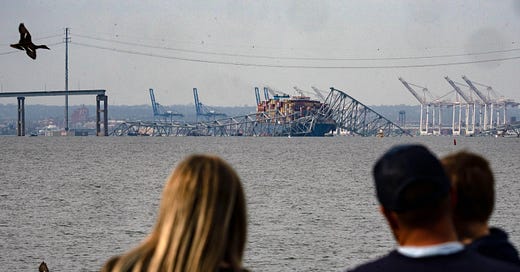Congress Already Showing Cracks on Aiding Baltimore After Bridge Collapse
Plus: MyPillow gets the boot
The tragic collapse of the Francis Scott Key Bridge in Baltimore is the sort of disaster you’d expect American lawmakers to join hands to address. In a more normal year, they might do just that. But this is the 118th Congress. The federal funds needed to clean up and rebuild the bridge likely won’t amount to a big ask in terms of Capitol Hill dollars—what’s a few hundred million here or there?—but approving any additional spending, particularly in an election year with a fractious and dysfunctional House, isn’t an easy task.
The process for providing relief will see funds routed through a number of different channels. Federal officials have pegged the total cost of the recovery-and-rebuilding effort at around $2 billion. While the federal government has close to $950 million in emergency funds, Treasury Secretary Janet Yellen said insurance policies will also play a significant role. But more immediately, lawmakers are exploring “quick-release” emergency funds. According to Rep. David Trone (D-Md.), who sits on the Appropriations Committee:
Our first priority is recovering those who perished in the collapse, supporting our first responders and workers affected, and standing by the people of Baltimore through this tragedy. As a Member of the Appropriations Committee, I am absolutely committed to delivering much-needed federal funding to reopen the Port of Baltimore and rebuild the Key Bridge. Right now at the federal level, we’re actively exploring the use of ‘quick release’ emergency relief funds in partnership with Secretary Buttigieg and the urgent deployment of Congressionally approved funding. This will be a team effort through and through. We have a long road ahead of us, but we will come back stronger—together.
The next step is the most consequential: an emergency supplemental package to clean everything up and rebuild the bridge. This will be necessary to lessen the supply chain disruptions of losing the bridge and access to the Port of Baltimore. Some estimate the coming economic impact to be as much as $15 million for every day the port remains closed.
Republicans often demand offsets for any new spending as a way to avoid adding to the national debt. Sometimes this habit does the opposite of what it’s meant to, as when they demanded cuts to the Internal Revenue Service in exchange for a supplemental aid package to Israel; the IRS cuts would have actually added to the federal deficit and made the aid package dead on arrival in the Democrat-controlled Senate. The stunt resulted in a protracted bout of congressional waffling on the issue, and it still hasn’t gotten the aid to Israel or other foreign countries in dire need of help.





